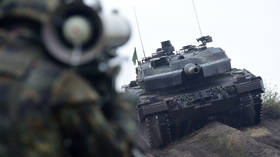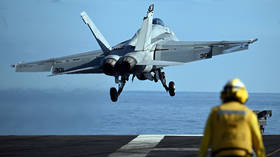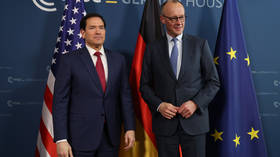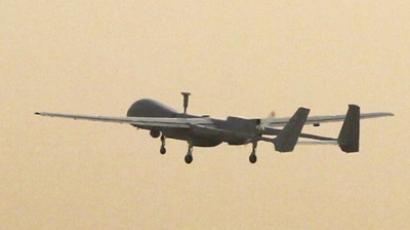Pakistan to US: It's drones or transit
Islamabad’s clear ultimatum to fully stop drone strikes in Pakistan has found no understanding in Washington which refuses to change its air warfare tactics. Consequently, logistic routes to Afghanistan remain closed to the US.
The United States Special Representative for Afghanistan and Pakistan Marc Grossman meeting with Pakistani officials in Islamabad has abstained from giving any promises the US will quit drone strikes. It’s his first visit to the country since the air strike last November which badly damaged US-Pakistani relations.Ahead of the talks in Islamabad on Thursday Pakistani Foreign Minister Hina Rabbani Khar sent a clear message that ending drone strikes is condition of fruitful co-operation. The US never listened to similar demands before, she said, adding “I hope their listening will improve”.However, the Ambassador tersely brushed aside a question on the cessation of future drone strikes by saying that the US and Pakistan have jointly made efforts on counter-terrorism against al-Qaeda and other militant groups, and in this regard Pakistan and the US have to continue to work together.At a news conference after the talks in Islamabad Pakistani Foreign Secretary Jalil Abbas Jilani showed that Pakistan is not going to make concessions: "We consider drones as illegal, non-productive and accordingly unacceptable."Parliamentary guidelines issued by the Parliamentary Committee on National Security (PCNS) in April have called for an apology from the US for last November’s NATO air strike, as well as a stop to future drone strikes. The parliamentary review of US-Pakistani relations was launched after a friendly fire incident when an American assault helicopter fired on a Pakistani outpost on the Afghan border which killed 24 Pakistani soldiers.Despite US apologies the question of drone strikes in Pakistan remains a stumbling bloc in bilateral relations.The US Special Envoy Marc Grossman said after the meeting that “Washington respects the Pakistani parliamentary review”.“Parliament has spoken and we respect that. It is not for us to pick and choose. It is for Pakistan to decide how to factor in these parliamentary recommendations,” he concluded.The US does not intend to abandon a program it considers successful, believes Robert Farley, an Assistant Professor at the University of Kentucky. “The US military believes that this (drones) is the easiest and the most efficient way to kill militants,” he told RT.Last week a commander of the corps in Pakistan’s northwest proposed an alternative to drones’ strikes. The US could share intelligence with Islamabad so the ally’s F-16 fighter jets could target militants on Pakistan’s soil, reported Reuters.
Pakistan routes vital for Afghanistan campaign
Having refused to discuss drone operations the US nevertheless hope to achieve some progress in talks on re-starting supplies to Afghanistan via Pakistan.“We want to work to reopen the ground lines of communication,” Grossman outlined. “No one came here expecting that we would solve all these problems. The goal was to set a basic philosophy and the teams will try to work on it," he added. Foreign Secretary Jalil Abbas Jilani replied that this issue had been discussed and that Pakistan was preparing for further exploratory meetings on the subject. “[The] arrangement that exists will not be valid and we have to work out a new arrangement. The process will begin as and when the Cabinet decides," he maintained.After the incident in November Islamabad refused to allow NATO forces to ship crucial food and military hardware to neighboring Afghanistan through Pakistani territory.The NATO/ISAF convoys going through Pakistan were the principal logistical supply route for coalition forces in Afghanistan, as the shortest and most economical. It has been used for a decade since the beginning of the military campaign in Afghanistan.Up to 75% of ammunition, vehicles, foodstuff and around 50% of fuel needed by the coalition forces fighting the Taliban were transported using the Pakistan route.Washington conducted talks with former Soviet republics in Central Asia trying to re-route supplies using an air bridge. But air logistics appeared more expensive, while delivering fuel for thousands of vehicles by air is really an irresolvable task. Washington addressed Moscow which agreed to help with transit, but refused to pass any weapons and ammunition. Thus Pakistan remains the preferred route for the supplies.If Pakistan refuses to re-open its borders to NATO convoys, it will make coalition operations in Afghanistan “considerably more difficult”, said Robert Farley, an Assistant Professor at the University of Kentucky.He stressed that supplying any sort of high intensity operations in Afghanistan via alternative routes would be much less economical.“I have friends in the military who have argued that the support through Pakistan is really critical to continuing operations in Afghanistan at any degree of efficiency,” Farley revealed to RT.














